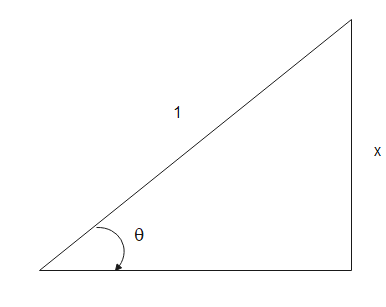We often need to convert inverse of sin to either inverse of cos, tan, sec, cosec , cot .In this post we will see how we can do it easily
Inverse of sin to inverse of cos
Case 1
$sin^{-1} x$ and x > 0
Now we can write as
$\theta=sin^{-1} x$
$sin \theta =x$
Now we know that here $\theta \in [0,\pi/2]$, so it is an acute angle
Now it can be written as
$sin \theta =\frac {x}{1} = \frac {perp}{hyp}$
In Right angle triangle

Now then base becomes
$\text{Base} = \sqrt { 1 -x^2}$
So , $cos \theta = \frac {base}{hyp} = \sqrt { 1 -x^2}$
or
$\theta= cos^{-1} \sqrt { 1 -x^2}$
or $sin^{-1} x = cos^{-1} \sqrt { 1 -x^2}$
Case II
$sin^{-1} x$ and x < 0
So value of the function will be in the range $[-\pi/2 , 0]$
Now we know from the property that
$sin^{-1} (-x)= – sin^{-1} (x)$
This can be written as
$sin^{-1} x = – sin^{-1} |x| = – cos^{-1} \sqrt { 1 -|x|^2}= – cos^{-1} \sqrt { 1 -x^2}$
This makes sense also as Range of the cos and sin function differ. We can convert with out worrying about the sign in $[0, \pi/2] as it is common
Thus ,we have different formula depending on the values of x
Inverse of sin to inverse of tan
Case 1
$sin^{-1} x$ and x > 0
from the above, we can write that
$tan \theta = \frac {perp}{base} = \frac {x}{\sqrt {1-x^2}}$
or
$sin^{-1} x = tan^{-1} \frac {x}{\sqrt { 1 -x^2}}$
Case II
$sin^{-1} x$ and x < 0
Now we know from the property that
$sin^{-1} (-x)= – sin^{-1} (x)$
This can be written as
$sin^{-1} x = – sin^{-1} |x| = – tan^{-1} \frac {x}{\sqrt { 1 -x^2}}= tan^{-1} \frac {-|x|}{\sqrt { 1 -x^2}} = tan^{-1} \frac {x}{\sqrt { 1 -x^2}}$
So we have same formula for any values of x
$sin^{-1} x = tan^{-1} \frac {x}{\sqrt { 1 -x^2}}$
Inverse of sin to inverse of cosec
This we already know from the property
$sin^{-1} x = cosec^{-1} \frac {1}{x}$
for all values of x [-1,1]
Inverse of sin to inverse of sec
Case 1
$sin^{-1} x$ and x > 0
from the above, we can write that
$sec \theta = \frac {hyp}{base} = \frac {1}{\sqrt {1-x^2}}$
or
$sin^{-1} x = sec^{-1} \frac {1}{\sqrt { 1 -x^2}}$
Case II
$sin^{-1} x$ and x < 0
Now we know from the property that
$sin^{-1} (-x)= – sin^{-1} (x)$
This can be written as
$sin^{-1} x = – sin^{-1} |x| = – sec^{-1} \frac {1}{\sqrt { 1 -x^2}} = – sec^{-1} \frac {1}{\sqrt { 1 -x^2}}$
This makes sense also as Range of the sec and sin function differ. We can convert with out worrying about the sign in $[0, \pi/2] as it is common
Thus ,we have different formula depending on the values of x
Inverse of sin to inverse of cot
Case 1
$sin^{-1} x$ and x > 0
from the above, we can write that
$cot \theta = \frac {base}{perp} = \frac{\sqrt {1-x^2}}{x}$
or
$sin^{-1} x = cot^{-1} \frac {\sqrt { 1 -x^2}}{x}$
Case II
$sin^{-1} x$ and x < 0
Now we know from the property that
$sin^{-1} (-x)= – sin^{-1} (x)$
This can be written as
$sin^{-1} x = – sin^{-1} |x| = – cot^{-1} \frac {\sqrt { 1 -x^2}}{|x|}$
This makes sense also as Range of the sec and sin function differ. We can convert with out worrying about the sign in $[0, \pi/2] as it is common
Thus ,we have different formula depending on the values of x
